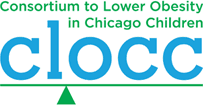By Adam Becker, PhD, MPH
Executive Director, Consortium to Lower Obesity in Chicago Children
As the New Year begins, I want to thank all of you who contributed to  making 2018 a productive and informative year in childhood obesity prevention. Looking back, I think it’s safe to say that 2018 was a transformative year for CLOCC. At the end of 2017 as we celebrated the Consortium’s 15th Anniversary, we set bicycle wheels in motion to expand our collective approach to include social determinants and root causes of childhood obesity. Issues such as income inequality, immigration and racial equity were prominent in the national consciousness, and CLOCC’s formative steps to explore and address these issues as “upstream” contributors to the obesity epidemic appeared even timelier. While we continued core efforts to promote good nutrition and physical activity, to strengthen environments that support those behaviors, and advocate for related policies at all levels of government, 2018 was a year that energized CLOCC staff and partners to come together and collaborate across an even broader spectrum of issues that affect children’s ability to eat healthy and be active where they live, learn, and play.
making 2018 a productive and informative year in childhood obesity prevention. Looking back, I think it’s safe to say that 2018 was a transformative year for CLOCC. At the end of 2017 as we celebrated the Consortium’s 15th Anniversary, we set bicycle wheels in motion to expand our collective approach to include social determinants and root causes of childhood obesity. Issues such as income inequality, immigration and racial equity were prominent in the national consciousness, and CLOCC’s formative steps to explore and address these issues as “upstream” contributors to the obesity epidemic appeared even timelier. While we continued core efforts to promote good nutrition and physical activity, to strengthen environments that support those behaviors, and advocate for related policies at all levels of government, 2018 was a year that energized CLOCC staff and partners to come together and collaborate across an even broader spectrum of issues that affect children’s ability to eat healthy and be active where they live, learn, and play.
New data indicate that childhood obesity rates are continuing to rise, especially in the “severely obese” category, and that racial and ethnic disparities persist. Here in Chicago, 19.1% percent of kindergartners and 18.2% of high schoolers are considered obese. As we know all too well, these trends continue to demonstrate ethnic and racial disparities. The 2015-16 National Health and Nutrition Examination surveys identified the prevalence of overweight and all classes of obesity were highest in Hispanic and black children (46% and 38%, respectively). New Healthy Chicago 2.0 data from the Chicago Department of Public Health (CDPH) show that while few kids are consuming sugary beverages (despite a lack of political leadership to sustain a tax at the County level and to initiate one at the State level) fewer are also attaining at least 60 minutes of daily physical activity. Fruit and vegetable consumption for youth also remained stagnant at just 18% having five or more servings a day, below our citywide goal of 20% meeting the 5-4-3-2-1 Go! recommendation. A recent telephone survey of 3,310 adult Chicagoans conducted by CDPH and CLOCC’s home institution, Ann & Robert H. Lurie Children’s Hospital, found that 62% considered childhood obesity to be one of their biggest concerns for children’s health, the second-highest ranked concern behind only drug abuse.
For 16 years our Consortium has worked to ensure that the best evidence-based strategies for obesity prevention are being implemented in childcare settings, schools, and neighborhoods across the city, but these recent data align with two ideas we articulated in 2018: that these strategies need to be better coordinated and co-located in communities facing obesity disparities, and that we must come together with experts in other disciplines to address the root causes of childhood obesity. Research continues to demonstrate how social and structural determinants such as racism, poverty, trauma, disinvestment in communities, a lack of affordable housing, and deteriorating neighborhood environments shape the health outcomes of our children. These issues are not just relevant for obesity and will require collaboration among those interested in other child health outcomes. That multi-sectoral work has already begun for CLOCC.
Our collective ability to navigate these new waters is bolstered by the size and diversity of our Consortium. Within our obesity-prevention network are individuals and organizations addressing myriad public health issues, with efforts spanning from neighborhood streets to the halls of Congress. It is a delicate process to incorporate an obesity-prevention lens to far-reaching societal issues such as racism or violence, but Consortium is motivated to shed light on these factors and forge new partnerships and new approaches to the address them. CLOCC staff has been inspired by the positive feedback and interest shown by our partners as we have charted this new course over the past year. As we begin to operationalize this expanded world-view and take on new action to address the root causes of childhood obesity, it is also inspiring to look back on some of the successes we have achieved together over the last year.
• Thanks to generous funding from Kohl’s Cares, CLOCC embarked upon a two-year, multi-sector outreach program to incorporate the 5-4-3-2-1 Go! healthy lifestyle message into Chicago Park District summer camp programming. Partnering with the Park District, CLOCC trained summer camp counselors in Little Village, Englewood and Rogers Park on how to deliver the message and integrate it into camp programming. We supported nutrition and physical activity behavior messaging with bike helmet distribution at community events, an out-of-home marketing campaign, and comprehensive pre-and-post-program evaluation indicating that our multi-pronged approach was influencing healthy behaviors.
• And speaking of the out-of-home marketing campaign, the Kohl’s Cares funding enabled us to give CLOCC’s 5-4-3-2-1 Go! message a much-needed makeover. The colorful new look and feel for the flyers and posters was also featured on billboards and bus kiosks in the three focus neighborhoods. As always, English and Spanish versions of the new flyer are available on the CLOCC website.
• Now in its third year, CLOCC’s “+Network“ continues to demonstrate its value for Chicago Public Schools working to achieve “Healthy CPS” status. For the 2017-18 school year, the 15 member-strong +Network contributed to a 76% average Healthy CPS achievement rate for schools receiving Healthy CPS technical assistance (compared to a 57% average Healthy CPS achievement rate among schools that did not receive any support). Following this success, we were excited to see the Plus Network grow to 18 member organizations for the 18-19 school year.
• The Consortium’s longstanding efforts to support Chicago-area hospitals along the path to Baby Friendly designation saw another success in 2018 as University of Chicago Medicine’s Comer Children’s Hospital Family Birth Center became the city’s fifth labor and delivery hospital to earn the distinction. As we wind down this work in 2019, we are extremely proud that in 4 short years we have helped all 5 Baby Friendly-designated hospitals in Chicago and two suburban hospitals to obtain this designation, indicating their success in implementing policies and practices that support breastfeeding among women making that choice.
• In September, CLOCC wrapped up the three years of supporting 25 corner stores in suburban Cook County, in collaboration with the Cook County Department of Public Health, the University of Illinois Extension, and community based organizations in 8 south and west suburbs to offer fresh produce and other healthy items to suburban shoppers.
• 2018 saw an important evolution in the format of CLOCC Quarterly Meetings. Based on feedback from Consortium partners throughout 2016-17, we used our convening opportunities to hone our understanding of the connections between childhood obesity and “upstream” issues such as housing, climate change, community economic vibrancy, and neighborhood walkability & accessibility. For the final meeting of 2018 we shared what we had learned with 100 participants who also helped us to identify policy challenges and opportunities to address the connections between obesity and mental health, immigration, housing and community development. These recommendations will influence our direction in 2019 and beyond.
Moving forward, CLOCC will continue to employ the strategies that have made this Consortium a leader in the field of childhood obesity prevention. We will continue to convene our hard working and passionate partners striving to ensure healthier futures for our kids. We will continue to communicate to our network the news, research, strategies and opportunities that can aid their work. Finally, we will continue to collaborate; identifying opportunities where CLOCC’s voice and resources can assist in addressing social determinants of obesity and improve opportunities for our children to live healthy and active lives.
The coming year will assuredly hold many challenges for those working in public health, but the CLOCC staff is driven by the tenacity and passion of our partners. We are eager to meet these challenges with you, and we wish you all a happy and healthy New Year!

